|
|
The Holy Prophet Elisha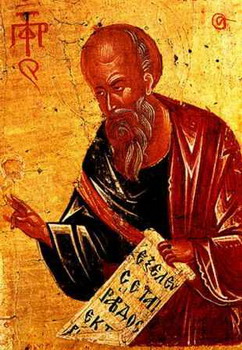 He lived nine hundred years before Christ. When the Lord willed to take the aged prophet Elias to Himself, He revealed to him that He had set aside Elisha, the son of Shaphat, of the tribe of Reuben and from the city of Abel-Menolah. to inherit his prophetic calling. Elias made the Lord's will known to Elisha and draped him in his mantle, asking God for a double portion of the grace of prophecy for him. Elisha at once left his home and his people and followed after Elias. When the Lord took Elias in the fiery chariot (A.V. II Kings 2:11), Elisha remained to carry on the work of prophecy with yet greater power than Elias. In his purity and zeal, he was equal to the greatest prophets, and surpassed all the others with the wondrous power given to him by God. He divided the waters of the Jordan as Moses once divided the Red Sea; he made the bitter waters in Jericho drinkable; he brought water down into the trenches in the war against the Moabites; he caused the widow's jars to fill to the brim with oil: he raised the dead son of the Shunammite woman; he fed a hundred people with twenty small loaves; he healed Naaman, captain of the hosts of Syria, of leprosy; he blinded an entire Syrian armv and put another to flight; he foretold many events both for the nation and for individuals, and went to his rest at a very great age. He lived nine hundred years before Christ. When the Lord willed to take the aged prophet Elias to Himself, He revealed to him that He had set aside Elisha, the son of Shaphat, of the tribe of Reuben and from the city of Abel-Menolah. to inherit his prophetic calling. Elias made the Lord's will known to Elisha and draped him in his mantle, asking God for a double portion of the grace of prophecy for him. Elisha at once left his home and his people and followed after Elias. When the Lord took Elias in the fiery chariot (A.V. II Kings 2:11), Elisha remained to carry on the work of prophecy with yet greater power than Elias. In his purity and zeal, he was equal to the greatest prophets, and surpassed all the others with the wondrous power given to him by God. He divided the waters of the Jordan as Moses once divided the Red Sea; he made the bitter waters in Jericho drinkable; he brought water down into the trenches in the war against the Moabites; he caused the widow's jars to fill to the brim with oil: he raised the dead son of the Shunammite woman; he fed a hundred people with twenty small loaves; he healed Naaman, captain of the hosts of Syria, of leprosy; he blinded an entire Syrian armv and put another to flight; he foretold many events both for the nation and for individuals, and went to his rest at a very great age.St Methodius, Patriarch of Constantinople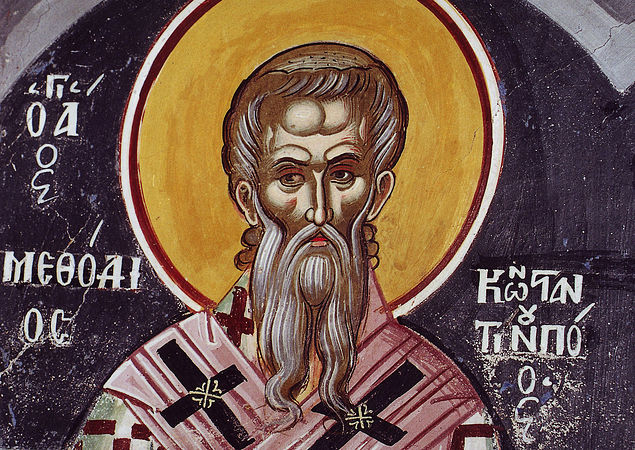 Born in the city of Syracuse in Sicily, he became a monk on completing his secular education and gave himself to the ascetic life in a monastery. Patriarch Nicephorus took him into his own service. During the time of the iconoclast Emperors, he was renowned on all sides as a staunch defender of the veneration of icons. For this reason, the wicked Emperor Theophilus exiled him to an island, where he spent seven whole years in prison with two common robbers, in damp conditions, without light and without sufficient food, as if in a grave. During the reign of the devout Empress Theodora and her son Michael, he was set at Patriarch, fulfilling an earlier prophecy of St Joannicius the Great. During the first week of the Great Fast, Methodius solemnly carried the icons into the church and wrote a Canon in their honour. Unable to get the better of him in any way, the vile heretics hired a woman to declare that the Patriarch had had physical relations with her. The whole of Constantinople was aghast at this slander. Not knowing how to prove his innocence in any other way, the Patriarch overcame his embarrassment and presented himself naked before the court, voluntarily showing them his body all withered and debilitated from fasting. The court was clearly persuaded that the Patriarch had been slandered. The people rejoiced at hearing this and the heretics were put to shame. Then the woman herself admitted that she had been persuaded and bribed to slander God"s saint, and thus those who sought to bring shame on Methodius unwittingly increased his fame. This great confessor of the Faith died peacefully in 847, and went to the Kingdom of God. Born in the city of Syracuse in Sicily, he became a monk on completing his secular education and gave himself to the ascetic life in a monastery. Patriarch Nicephorus took him into his own service. During the time of the iconoclast Emperors, he was renowned on all sides as a staunch defender of the veneration of icons. For this reason, the wicked Emperor Theophilus exiled him to an island, where he spent seven whole years in prison with two common robbers, in damp conditions, without light and without sufficient food, as if in a grave. During the reign of the devout Empress Theodora and her son Michael, he was set at Patriarch, fulfilling an earlier prophecy of St Joannicius the Great. During the first week of the Great Fast, Methodius solemnly carried the icons into the church and wrote a Canon in their honour. Unable to get the better of him in any way, the vile heretics hired a woman to declare that the Patriarch had had physical relations with her. The whole of Constantinople was aghast at this slander. Not knowing how to prove his innocence in any other way, the Patriarch overcame his embarrassment and presented himself naked before the court, voluntarily showing them his body all withered and debilitated from fasting. The court was clearly persuaded that the Patriarch had been slandered. The people rejoiced at hearing this and the heretics were put to shame. Then the woman herself admitted that she had been persuaded and bribed to slander God"s saint, and thus those who sought to bring shame on Methodius unwittingly increased his fame. This great confessor of the Faith died peacefully in 847, and went to the Kingdom of God.St John, Metropolitan of Euchaita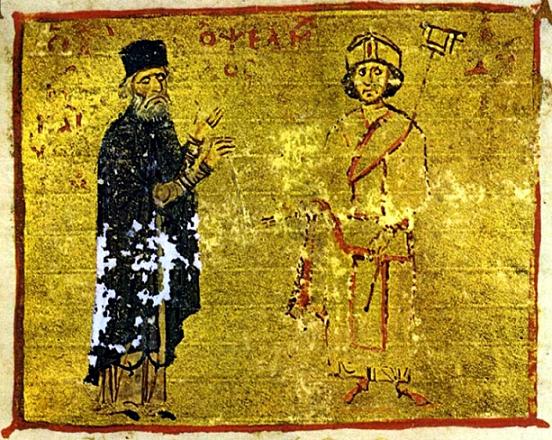 Nicknamed "Mavropous" (Blackfeet), he was a man of great scholarship and true spirituality. When the Emperor Alexius Comnenis was very old, John became Metropolitan of Euchaita. He is particularly famed because St Basil, St Gregory the Theologian and St John Chrysostom all appeared to him (see January 30th), and revealed to him how they are, all three, equally glorified in heaven. After this vision, the bickering among the people was quieted, for they had been quarrelling about which of the three was the greatest. St John also composed the well-known Canon to the Most Sweet Jesus and the Canon to the Guardian Angel, and he also compiled several instructive books. He entered peacefully into rest in the second half of the 11th century. Nicknamed "Mavropous" (Blackfeet), he was a man of great scholarship and true spirituality. When the Emperor Alexius Comnenis was very old, John became Metropolitan of Euchaita. He is particularly famed because St Basil, St Gregory the Theologian and St John Chrysostom all appeared to him (see January 30th), and revealed to him how they are, all three, equally glorified in heaven. After this vision, the bickering among the people was quieted, for they had been quarrelling about which of the three was the greatest. St John also composed the well-known Canon to the Most Sweet Jesus and the Canon to the Guardian Angel, and he also compiled several instructive books. He entered peacefully into rest in the second half of the 11th century.Our Holy Father Niphon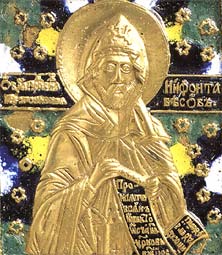 Born in the region of Argyrocastra in the village of Lukov, he was the son of a priest. He was attracted in his youth by the desire for solitude and prayer. This desire finally led him to the Holy Mountain, where he at first lived out his asceticism in the cave of St Peter the Athonite and then in the desert of St Anne. He would not eat bread, but fed himself on grass and roots. Some envious men accused him of disdaining bread, but he easily and speedily justified himself. Finally he became associated with St Maximus of Kapsokaiyvia. For his great love towards God, Niphon was granted the gifts of wonderworking and discernment. He used to heal the sick with prayer and anointing with oil, and he clearly saw events both past and future. He foretold his own death during the Petertide fast. When the day of his departure dawned, he said to the brethren around him: "Do not weep, but rather rejoice, because you will have someone to pray for your salvation before God." At the end, he said: "It is time for me to go", and he surrendered his holy soul to God. This was on June 14th, 1411. Born in the region of Argyrocastra in the village of Lukov, he was the son of a priest. He was attracted in his youth by the desire for solitude and prayer. This desire finally led him to the Holy Mountain, where he at first lived out his asceticism in the cave of St Peter the Athonite and then in the desert of St Anne. He would not eat bread, but fed himself on grass and roots. Some envious men accused him of disdaining bread, but he easily and speedily justified himself. Finally he became associated with St Maximus of Kapsokaiyvia. For his great love towards God, Niphon was granted the gifts of wonderworking and discernment. He used to heal the sick with prayer and anointing with oil, and he clearly saw events both past and future. He foretold his own death during the Petertide fast. When the day of his departure dawned, he said to the brethren around him: "Do not weep, but rather rejoice, because you will have someone to pray for your salvation before God." At the end, he said: "It is time for me to go", and he surrendered his holy soul to God. This was on June 14th, 1411.St. Cyril of GortyneVenerable Julitta (Julia) of Tabenna in Egypt
Venerable Elisha, monk, of Suma (Solovki) (15th- 16th c.)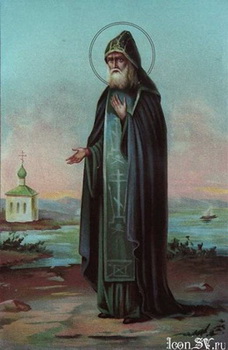 The Monk Elisei of Sumsk – took monastic vows at the Solovetsk monastery. He was occupied with the plaiting of fishing nets. Before death he became a schemamonk. In 1688 miracles began from the grave of the monk, resting beneathe a crypt in the Nikol'sk church of the city of Suma, Archangel'sk diocese. The Monk Elisei of Sumsk – took monastic vows at the Solovetsk monastery. He was occupied with the plaiting of fishing nets. Before death he became a schemamonk. In 1688 miracles began from the grave of the monk, resting beneathe a crypt in the Nikol'sk church of the city of Suma, Archangel'sk diocese.St. Mstislav-George, prince of Novgorod (1180)
|